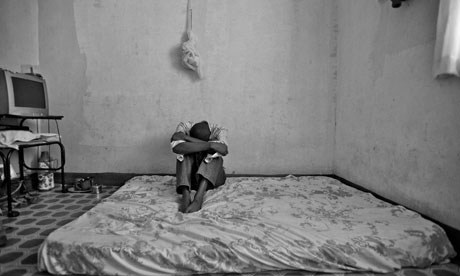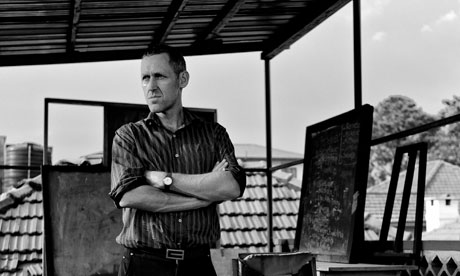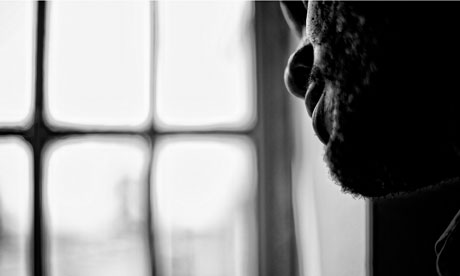Οι τραγικές ιστορίες ανδρών που κακοποιούνται σεξουαλικά σε εμπόλεμες ζώνες,
και η εξοστράκιση από την κοινωνία τους...
(Κι εδώ άλλο σχετικό ποστ για το σεξ στη φυλακή.)
The rape of men
Sexual violence is one of the most horrific weapons of war, an instrument of terror used against women. Yet huge numbers of men are also victims. In this harrowing report, Will Storr travels to Uganda to meet traumatised survivors, and reveals how male rape is endemic in many of the world's conflicts

Dying of shame: a Congolese rape victim, currently resident in Uganda. This man’s wife has left him, as she was unable to accept what happened. He attempted suicide at the end of last year. Photograph: Will Storr for the Observer
Of all the secrets of war, there is one that is so well kept that it exists mostly as a rumour. It is usually denied by the perpetrator and his victim. Governments, aid agencies and human rights defenders at the UN barely acknowledge its possibility. Yet every now and then someone gathers the courage to tell of it. This is just what happened on an ordinary afternoon in the office of a kind and careful counsellor in Kampala, Uganda. For four years Eunice Owiny had been employed by Makerere University's Refugee Law Project (RLP) to help displaced people from all over Africa work through their traumas. This particular case, though, was a puzzle. A female client was having marital difficulties. "My husband can't have sex," she complained. "He feels very bad about this. I'm sure there's something he's keeping from me."
Owiny invited the husband in. For a while they got nowhere. Then Owiny asked the wife to leave. The man then murmured cryptically: "It happened to me." Owiny frowned. He reached into his pocket and pulled out an old sanitary pad. "Mama Eunice," he said. "I am in pain. I have to use this."
Laying the pus-covered pad on the desk in front of him, he gave up his secret. During his escape from the civil war in neighbouring Congo, he had been separated from his wife and taken by rebels. His captors raped him, three times a day, every day for three years. And he wasn't the only one. He watched as man after man was taken and raped. The wounds of one were so grievous that he died in the cell in front of him.
"That was hard for me to take," Owiny tells me today. "There are certain things you just don't believe can happen to a man, you get me? But I know now that sexual violence against men is a huge problem. Everybody has heard the women's stories. But nobody has heard the men's."
It's not just in East Africa that these stories remain unheard. One of the few academics to have looked into the issue in any detail is Lara Stemple, of the University of California's Health and Human Rights Law Project. Her study Male Rape and Human Rights notes incidents of male sexual violence as a weapon of wartime or political aggression in countries such as Chile, Greece, Croatia, Iran, Kuwait, the former Soviet Union and the former Yugoslavia. Twenty-one per cent of Sri Lankan males who were seen at a London torture treatment centre reported sexual abuse while in detention. In El Salvador, 76% of male political prisoners surveyed in the 1980s described at least one incidence of sexual torture. A study of 6,000 concentration-camp inmates in Sarajevo found that 80% of men reported having been raped.
I've come to Kampala to hear the stories of the few brave men who have agreed to speak to me: a rare opportunity to find out about a controversial and deeply taboo issue. In Uganda, survivors are at risk of arrest by police, as they are likely to assume that they're gay – a crime in this country and in 38 of the 53 African nations. They will probably be ostracised by friends, rejected by family and turned away by the UN and the myriad international NGOs that are equipped, trained and ready to help women. They are wounded, isolated and in danger. In the words of Owiny: "They are despised."
But they are willing to talk, thanks largely to the RLP's British director, Dr Chris Dolan. Dolan first heard of wartime sexual violence against men in the late 1990s while researching his PhD in northern Uganda, and he sensed that the problem might be dramatically underestimated. Keen to gain a fuller grasp of its depth and nature, he put up posters throughout Kampala in June 2009 announcing a "workshop" on the issue in a local school. On the day, 150 men arrived. In a burst of candour, one attendee admitted: "It's happened to all of us here." It soon became known among Uganda's 200,000-strong refugee population that the RLP were helping men who had been raped during conflict. Slowly, more victims began to come forward.
I meet Jean Paul on the hot, dusty roof of the RLP's HQ in Old Kampala. He wears a scarlet high-buttoned shirt and holds himself with his neck lowered, his eyes cast towards the ground, as if in apology for his impressive height. He has a prominent upper lip that shakes continually – a nervous condition that makes him appear as if he's on the verge of tears.
Jean Paul was at university in Congo, studying electronic engineering, when his father – a wealthy businessman – was accused by the army of aiding the enemy and shot dead. Jean Paul fled in January 2009, only to be abducted by rebels. Along with six other men and six women he was marched to a forest in the Virunga National Park.
Later that day, the rebels and their prisoners met up with their cohorts who were camped out in the woods. Small camp fires could be seen here and there between the shadowy ranks of trees. While the women were sent off to prepare food and coffee, 12 armed fighters surrounded the men. From his place on the ground, Jean Paul looked up to see the commander leaning over them. In his 50s, he was bald, fat and in military uniform. He wore a red bandana around his neck and had strings of leaves tied around his elbows.
"You are all spies," the commander said. "I will show you how we punish spies." He pointed to Jean Paul. "Remove your clothes and take a position like a Muslim man."
Jean Paul thought he was joking. He shook his head and said: "I cannot do these things."
The commander called a rebel over. Jean Paul could see that he was only about nine years old. He was told, "Beat this man and remove this clothes." The boy attacked him with his gun butt. Eventually, Jean Paul begged: "Okay, okay. I will take off my clothes." Once naked, two rebels held him in a kneeling position with his head pushed towards the earth.
At this point, Jean Paul breaks off. The shaking in his lip more pronounced than ever, he lowers his head a little further and says: "I am sorry for the things I am going to say now." The commander put his left hand on the back of his skull and used his right to beat him on the backside "like a horse". Singing a witch doctor song, and with everybody watching, the commander then began. The moment he started, Jean Paul vomited.
Eleven rebels waited in a queue and raped Jean Paul in turn. When he was too exhausted to hold himself up, the next attacker would wrap his arm under Jean Paul's hips and lift him by the stomach. He bled freely: "Many, many, many bleeding," he says, "I could feel it like water." Each of the male prisoners was raped 11 times that night and every night that followed.
On the ninth day, they were looking for firewood when Jean Paul spotted a huge tree with roots that formed a small grotto of shadows. Seizing his moment, he crawled in and watched, trembling, as the rebel guards searched for him. After five hours of watching their feet as they hunted for him, he listened as they came up with a plan: they would let off a round of gunfire and tell the commander that Jean Paul had been killed. Eventually he emerged, weak from his ordeal and his diet of only two bananas per day during his captivity. Dressed only in his underpants, he crawled through the undergrowth "slowly, slowly, slowly, slowly, like a snake" back into town.
 "The organisations working on sexual violence don't talk about it:" Chris Dolan, director of the Refugee Law Project. Photograph: Will Storr for the Observer
"The organisations working on sexual violence don't talk about it:" Chris Dolan, director of the Refugee Law Project. Photograph: Will Storr for the ObserverToday, despite his hospital treatment, Jean Paul still bleeds when he walks. Like many victims, the wounds are such that he's supposed to restrict his diet to soft foods such as bananas, which are expensive, and Jean Paul can only afford maize and millet. His brother keeps asking what's wrong with him. "I don't want to tell him," says Jean Paul. "I fear he will say: 'Now, my brother is not a man.'"
It is for this reason that both perpetrator and victim enter a conspiracy of silence and why male survivors often find, once their story is discovered, that they lose the support and comfort of those around them. In the patriarchal societies found in many developing countries, gender roles are strictly defined.
"In Africa no man is allowed to be vulnerable," says RLP's gender officer Salome Atim. "You have to be masculine, strong. You should never break down or cry. A man must be a leader and provide for the whole family. When he fails to reach that set standard, society perceives that there is something wrong."
Often, she says, wives who discover their husbands have been raped decide to leave them. "They ask me: 'So now how am I going to live with him? As what? Is this still a husband? Is it a wife?' They ask, 'If he can be raped, who is protecting me?' There's one family I have been working closely with in which the husband has been raped twice. When his wife discovered this, she went home, packed her belongings, picked up their child and left. Of course that brought down this man's heart."
Back at RLP I'm told about the other ways in which their clients have been made to suffer. Men aren't simply raped, they are forced to penetrate holes in banana trees that run with acidic sap, to sit with their genitals over a fire, to drag rocks tied to their penis, to give oral sex to queues of soldiers, to be penetrated with screwdrivers and sticks. Atim has now seen so many male survivors that, frequently, she can spot them the moment they sit down. "They tend to lean forward and will often sit on one buttock," she tells me. "When they cough, they grab their lower regions. At times, they will stand up and there's blood on the chair. And they often have some kind of smell."
Because there has been so little research into the rape of men during war, it's not possible to say with any certainty why it happens or even how common it is – although a rare 2010 survey, published in theJournal of the American Medical Association, found that 22% of men and 30% of women in Eastern Congo reported conflict-related sexual violence. As for Atim, she says: "Our staff are overwhelmed by the cases we've got, but in terms of actual numbers? This is the tip of the iceberg."
Later on I speak with Dr Angella Ntinda, who treats referrals from the RLP. She tells me: "Eight out of 10 patients from RLP will be talking about some sort of sexual abuse."
"Eight out of 10 men?" I clarify.
"No. Men and women," she says.
"What about men?"
"I think all the men."
I am aghast.
"All of them?" I say.
"Yes," she says. "All the men."
The research by Lara Stemple at the University of California doesn't only show that male sexual violence is a component of wars all over the world, it also suggests that international aid organisations are failing male victims. Her study cites a review of 4,076 NGOs that have addressed wartime sexual violence. Only 3% of them mentioned the experience of men in their literature. "Typically," Stemple says, "as a passing reference."
 “One man was told: ‘We have a programme for vulnerable women but not men”: a Congolese rape victim. Photograph: Will Storr for the Observer
“One man was told: ‘We have a programme for vulnerable women but not men”: a Congolese rape victim. Photograph: Will Storr for the ObserverOn my last night I arrive at the house of Chris Dolan. We're high on a hill, watching the sun go down over the neighbourhoods of Salama Road and Luwafu, with Lake Victoria in the far distance. As the air turns from blue to mauve to black, a muddled galaxy of white, green and orange bulbs flickers on; a pointillist accident spilled over distant valleys and hills. A magnificent hubbub rises from it all. Babies screaming, children playing, cicadas, chickens, songbirds, cows, televisions and, floating above it all, the call to prayer at a distant mosque.
Stemple's findings on the failure of aid agencies is no surprise to Dolan. "The organisations working on sexual and gender-based violence don't talk about it," he says. "It's systematically silenced. If you're very, very lucky they'll give it a tangential mention at the end of a report. You might get five seconds of: 'Oh and men can also be the victims of sexual violence.' But there's no data, no discussion."
As part of an attempt to correct this, the RLP produced a documentary in 2010 called Gender Against Men. When it was screened, Dolan says that attempts were made to stop him. "Were these attempts by people in well-known, international aid agencies?" I ask.
"Yes," he replies. "There's a fear among them that this is a zero-sum game; that there's a pre-defined cake and if you start talking about men, you're going to somehow eat a chunk of this cake that's taken them a long time to bake." Dolan points to a November 2006 UN report that followed an international conference on sexual violence in this area of East Africa.
"I know for a fact that the people behind the report insisted the definition of rape be restricted to women," he says, adding that one of the RLP's donors, Dutch Oxfam, refused to provide any more funding unless he'd promise that 70% of his client base was female. He also recalls a man whose case was "particularly bad" and was referred to the UN's refugee agency, the UNHCR. "They told him: 'We have a programme for vulnerable women, but not men.'"
It reminds me of a scene described by Eunice Owiny: "There is a married couple," she said. "The man has been raped, the woman has been raped. Disclosure is easy for the woman. She gets the medical treatment, she gets the attention, she's supported by so many organisations. But the man is inside, dying."
"In a nutshell, that's exactly what happens," Dolan agrees. "Part of the activism around women's rights is: 'Let's prove that women are as good as men.' But the other side is you should look at the fact that men can be weak and vulnerable."
Margot Wallström, the UN special representative of the secretary-general for sexual violence in conflict, insists in a statement that the UNHCR extends its services to refugees of both genders. But she concedes that the "great stigma" men face suggests that the real number of survivors is higher than that reported. Wallström says the focus remains on women because they are "overwhelmingly" the victims. Nevertheless, she adds, "we do know of many cases of men and boys being raped."
But when I contact Stemple by email, she describes a "constant drum beat that women are the rape victims" and a milieu in which men are treated as a "monolithic perpetrator class".
"International human rights law leaves out men in nearly all instruments designed to address sexual violence," she continues. "The UN Security Council Resolution 1325 in 2000 treats wartime sexual violence as something that only impacts on women and girls… Secretary of State Hillary Clinton recently announced $44m to implement this resolution. Because of its entirely exclusive focus on female victims, it seems unlikely that any of these new funds will reach the thousands of men and boys who suffer from this kind of abuse. Ignoring male rape not only neglects men, it also harms women by reinforcing a viewpoint that equates 'female' with 'victim', thus hampering our ability to see women as strong and empowered. In the same way, silence about male victims reinforces unhealthy expectations about men and their supposed invulnerability."
Considering Dolan's finding that "female rape is significantly underreported and male rape almost never", I ask Stemple if, following her research, she believes it might be a hitherto unimagined part of all wars. "No one knows, but I do think it's safe to say that it's likely that it's been a part of many wars throughout history and that taboo has played a part in the silence."
As I leave Uganda, there's a detail of a story that I can't forget. Before receiving help from the RLP, one man went to see his local doctor. He told him he had been raped four times, that he was injured and depressed and his wife had threatened to leave him. The doctor gave him a Panadol.
No comments:
Post a Comment